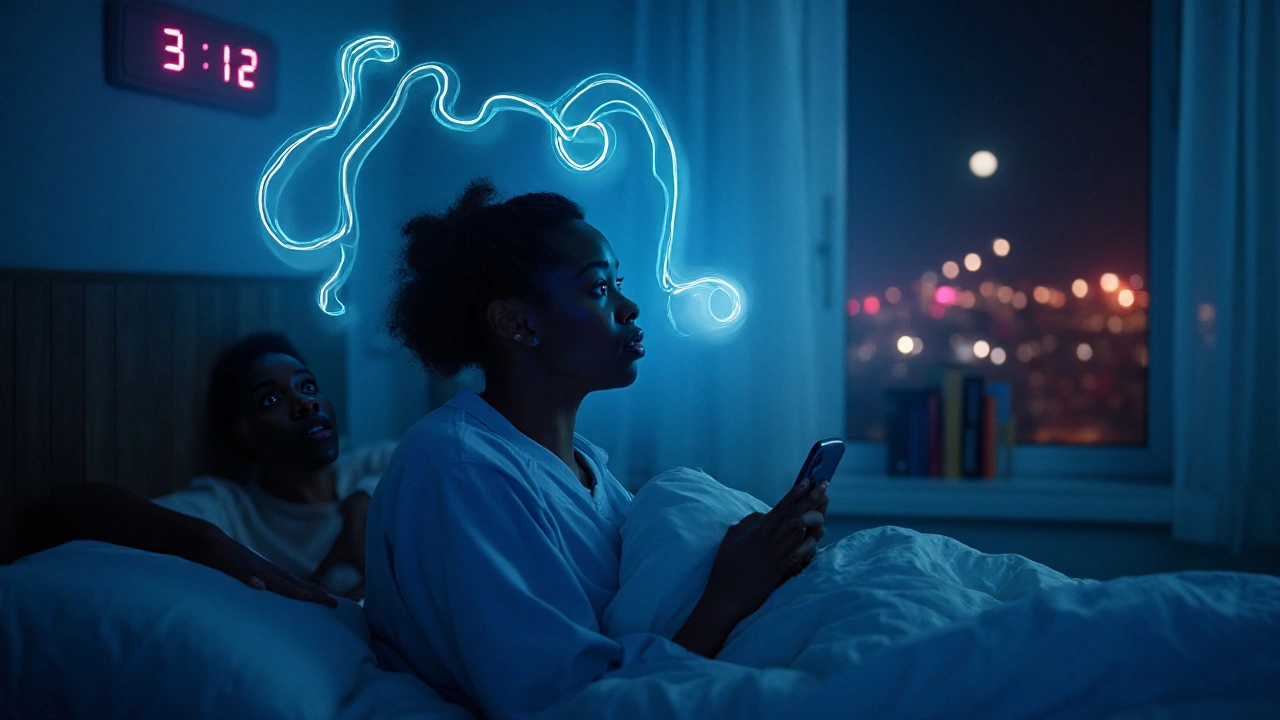
Sleep Disorders and Anxiety: Causes, Signs, and Evidence‑Based Fixes
Struggling with sleepless nights and racing thoughts? Learn how sleep disorders and anxiety fuel each other and what actually works to break the cycle.
Ever lie awake wondering why you can't drift off? That's a clue you might have a sleep disorder. It’s not just ‘bad night’ – it’s a medical condition that messes with how you fall asleep, stay asleep, or even how deep your sleep is. The good news? Knowing the signs and options makes a huge difference.
Insomnia tops the list. It shows up as trouble falling asleep, waking up too early, or just tossing and turning all night. Stress, caffeine, or an overactive brain often trigger it, but chronic insomnia can signal an underlying health issue.
Sleep apnea is another big player. The airway narrows or collapses while you breathe, causing brief pauses and loud snoring. Those interruptions lower oxygen levels and leave you feeling exhausted even after a full night.
Restless Leg Syndrome (RLS) creeps in with an uncomfortable urge to move the legs, especially when you’re trying to sleep. It can be linked to low iron, certain meds, or nerve problems. Speaking of nerves, gabapentin or pregabalin (often compared in our "Pregabalin vs Gabapentin" guide) are sometimes prescribed to calm RLS symptoms.
Shift work disorder hits people who work nights or rotating shifts. Their internal clock gets scrambled, making it hard to stay alert at work and sleep when off‑clock.
Parasomnias cover weird nighttime behaviors like sleepwalking or night terrors. They’re more common in kids but can persist into adulthood.
First‑line treatment usually means tweaking habits. Stick to a regular bedtime, dim lights an hour before sleep, and avoid screens. A warm shower, light reading, or gentle stretching can signal your brain it’s time to wind down.
Caffeine and alcohol are sneaky sleep thieves. Try cutting them out after early afternoon and see if your sleep improves within a week.
If habits aren’t enough, consider cognitive‑behavioral therapy for insomnia (CBT‑I). It’s a short‑term program that reshapes thoughts about sleep and teaches practical strategies. It often works better than prescription pills.
When medication is needed, doctors might prescribe short‑acting hypnotics or low‑dose antidepressants. For sleep apnea, a CPAP machine keeps the airway open and can dramatically boost daytime energy.
Natural aids also have a place. Our "Bergamot Supplement Benefits" article notes bergamot’s calming effect, which some people use to ease anxiety that blocks sleep. Resveratrol, highlighted in another guide, supports overall heart health, indirectly helping sleep quality.
Quitting smoking can remove a hidden insomnia trigger. The "Zyban" stop‑smoking pill not only helps break nicotine addiction but also improves sleep patterns once cravings fade.
For restless legs, iron supplements (if you’re low) or the gabapentinoids mentioned earlier can bring relief. Always talk to a pharmacist or doctor before adding new meds.
Lastly, remember that chronic sleep problems deserve a professional check‑up. Conditions like hypothyroidism, depression, or chronic pain can masquerade as sleep disorders. A thorough evaluation ensures you get the right treatment plan.
Getting better sleep isn’t a myth—it’s a mix of smart habits, targeted treatments, and sometimes a little medical help. Start with one change today, track how you feel, and build from there. Your body will thank you with more energy, sharper focus, and a brighter mood.

Struggling with sleepless nights and racing thoughts? Learn how sleep disorders and anxiety fuel each other and what actually works to break the cycle.